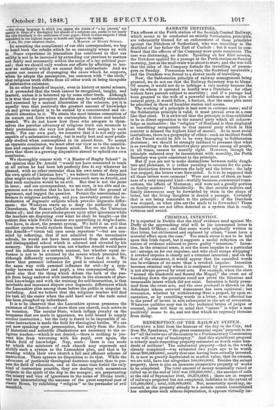CRIMINAL INTENTION.
IT is reported in Dublin that the chief evidence used against Mr. Duffy at the approaching trial will be his intercepted letter to Mr. Smith O'Brien ; and that some words originally written in that letter, but obliterated and replaced by others? "must have a material effect upon the case." Too much stress is not to be laid upon this Irish report, but it suggests a useful reflection on the nature of evidence adduced to prove guilty. "intention." Inten- tion, in the criminal sense, is not the mere impulse to a particular act: arraign us for our impulses, and who shall escape whipping? A revoked impulse is clearly not a criminal intention ; and on the face of the statement, it would appear that the cancelled words can be evidence of no more than a revoked impulse. Intention becomes criminal only when it is confirmed by perseverance. It is not always proved by overt acts. For example, when the slave "missed the bluebottle and floored the Mogul," the overt act of knocking down the potentate could not prove the felonious and treasonable intent which did not exist. Intention is fairly presu- med from the overt acts, and the onus probandi is thrown on the defendant whose outward demeanour has been equivocal ; but revocation, whether by withdrawing from a project, by open re- cantation, or by cancelling words in a letter, is an effectual bar to the proof of intent in acts subsequent to the act of revocation. Whatever quibbles may run in the technical brains of judges or counsel, juries will bear in mind that "intent" is what a man positively means to do, and not that which he expressly abstains from doing.


























 Previous page
Previous page